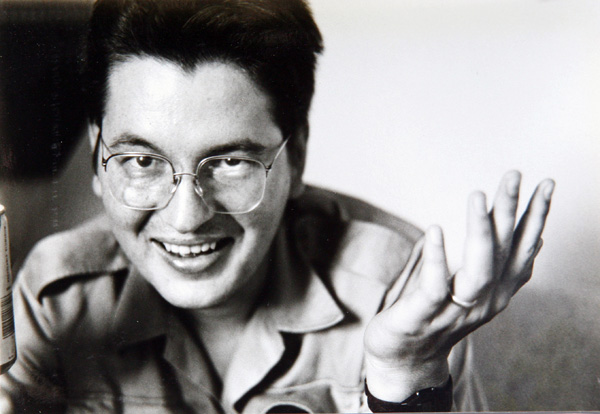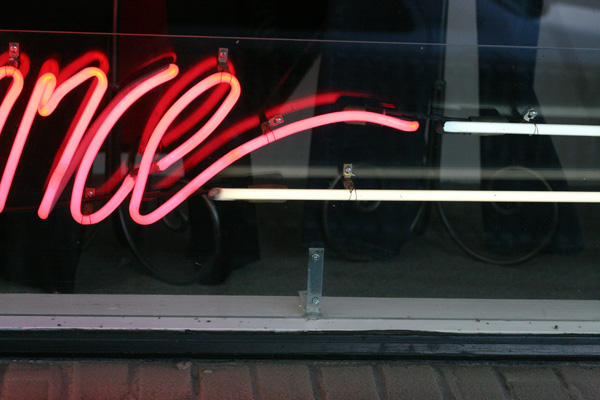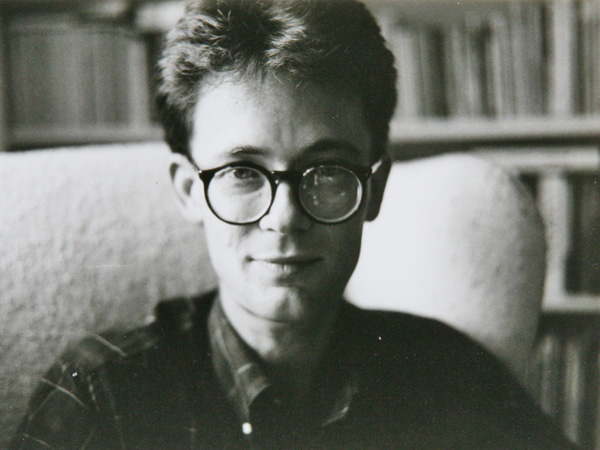[Excerpts from my memoir, Nested Scrolls.]
I started getting mail from a younger writer in Texas called Bruce Sterling. He’d written glowing reviews of Spacetime Donuts and White Light in a weekly free newspaper in Austin—he was one of the very first critics to appreciate these books. Soon after this, Bruce began publishing a zine called Cheap Truth.

Bruce loved all things Soviet—it wasn’t that he was a Communist, it was more that he dug the parallel world aspect of a superpower totally different from America. He spoke of Cheap Truth as a samizdat publication, meaning that, rather than printing a lot of copies, he encouraged people to Xerox their copies and pass them from hand to hand.

Reading Bruce’s sporadic mailings of Cheap Truth, I learned there were a number of other disgruntled and radicalized new SF writers like me. The Cheap Truth rants were authored by people with pseudonyms like Sue Denim and Vincent Omniaveritas. I was too out of the loop to try and figure out who was who, but I took note of the authors being hyped: Bruce Sterling, Lew Shiner, William Gibson, Pat Cadigan, John Shirley, and Greg Bear. I couldn’t actually find books by many of these people in Lynchburg, Virginia, although Bruce did mail me a couple of his novels, including Involution Ocean, a delightful take on Moby Dick which features dopers on a sea of sand. This work has some transreal qualities, and I liked it lot, including its unexpectedly maniacal ending…it’s a shame the book is currently so hard to find.

Sterling’s zine, Cheap Truth¸ didn’t have any particular name for the emerging new SF movement—it wouldn’t be until the next year that the cyberpunk label would take hold. I got together with Sterling, William Gibson, and Lew Shiner in September of 1983. We partied together at a world science fiction convention in Baltimore—they’d all read my new novel The Sex Sphere, which had just been published by Ace.

Gibson was an impressive guy from the start. He was tall, with an unusually thin and somewhat flexible-looking head. When I met him at one of the con parties, he said he was high on some SF-sounding substance I’d never heard of. Perfect. He was bright, funny, intense, and with a comfortable Virginia accent.
Back home in Lynchburg, I spent a day at my downtown office as usual and drove home in our black and white Buick, resplendent in the Hawaiian shirt that Sylvia had sewn for me. And there were Gibson, Sterling and Shiner on our front porch, along with Bruce’s wife, Nancy, and Lew’s friend, Edie. They’d decided to drive down after the convention.

These guys were all a bit younger than me—I was thirty-seven by now. To some extent they looked up to me. I was thrilled to join forces with them, it felt like being an early Beat.
I’d meet the other canonical cyberpunk, John Shirley, two years later, when we were both staying with Bruce and Nancy Sterling in Austin, Texas, in town for a science fiction convention that was featuring a panel on cyberpunk. John was a trip. When I woke up on Sterling’s couch in the morning, John was leaning over me, staring at my face.
“I’m trying to analyze the master’s vibes,” he told me.

The antic SF personage Charles Platt was there in spirit, he’d mailed Bruce a primitive Mandelbrot set program that he’d written in Basic. We’d set the program to running on Bruce’s primitive Amiga computer, and a couple of hours later we’d see a new zoom into the bug-shaped fractal—chunky pixels colored in blue, magenta and cyan.,
As we walked around Austin together talking, John had a habit of picking up some random large stone from a lawn, lugging it over to me, and putting it into my hands. Sometimes I’d be so into the conversation that I’d just carry the rock along for a few steps before noticing it.

Naturally we’d get high in the evenings. I recall driving a rented Lincoln around town with John. He was riffing off my book Software, leaning out of our car window to scream at the Texas drivers, “Y’all ever ate any live brains?”
The writers on the Cyberpunk panel were me, Shirley, Sterling, Lew Shiner, Pat Cadigan, and Greg Bear. Gibson couldn’t make it. The moderator—whose name I’ve forgotten or never knew—hadn’t read any of my work, and was bursting with venom against all of us. He represented the population of SF fans who are looking for a security blanket rather than for higher consciousness. For his ilk, cyberpunk was an annoyance or even a threat. He’d slid through the 1970s thinking of himself as with-it, and cyberpunk was yanking his covers.

To my eyes, the audience began taking on the look of a lynch mob. Here I’m finally asked to join a literary movement, and everyone hates me before I can even open my mouth? Enraged by the moderator’s ongoing barrage of insults, John Shirley got up and walked out, followed by Sterling and Shiner. But I stayed up there. I’d traveled a long distance for my moment in the sun.
“So I guess cyberpunk is dead now?” said Shiner afterwards.
I didn’t think do. Surely, if we could make plastic people that uptight, we were on the right track. That’s what the punk part was all about.









November 18th, 2008 at 3:11 pm
Wow, how that takes me back.
In 1983 I was a spotty 19-year-old, just starting university and three years away from my first short story sale — a bad cyberpunk homage (think William Gibson meets William Burroughs). I’d read Neuromancer and it did weird things to my skull, and I was bugging Bruce to mail me copies of Cheap Truth. I really wanted to be a big bad cyberpunk …
… And then one morning in the late 1990s I woke up and realized I was working for a dot-com startup, sleeping on a futon with a girlfriend who had purple dreadlocks in an apartment with eighteen or so decaying computers in various states of disrepair; we were eating cheap malaysian take-aways and I was really pissed off with my employers and plotting a defection of the developer team to a rival corporation, and this whole cyberpunk lifestyle thing was much better to read about, thank you very much and good night!
November 18th, 2008 at 3:40 pm
For a number of years I’ve toyed with the idea of writing a quasi-academic book about the c-punk movement: “The Color of Television.” I may yet give it a stab!
November 18th, 2008 at 4:41 pm
is there something weong in my head? i know my liver & general body system – but Orion is clear tonite her in KT & i think it’s a little odd that the pirates should capture a large tanker with 25 hostages (2 of whom according to the “beeb” are British – like what are the other 23?
anyway the Tanker is the Sirius Star now Siriusly is this worth considering in the whole project that seens to be throwing out disinfo?
help
November 18th, 2008 at 9:41 pm
Mr. Stross, you just summarized my entire career working in a massive datacenter, except from the SDE side of the house. I think something has gone horribly, horribly wrong here.
November 18th, 2008 at 9:58 pm
I used to read a lot of SF including CP until I started living it; US Navy Electronics Warfare, ASMD/ELINT. Fact is way stranger than fiction…
November 18th, 2008 at 11:04 pm
I’m looking forward to hearing more. I read a lot of this stuff as a pre-teen and teen (born in ’71) and you (Rucker), Sterling, and Gibson have influenced my life through your writing far more than you’ll ever know. I remember barely being a teen and waiting for your novels, naively wishing for aspects of the futures that you painted, at least in tone.
After 14 or so years working in tech (including a near decade stint at Microsoft), I think, like Stross above, I wound up seeing the reality of what became a little too much at times.
That being said, I’ve loved just about everything you’ve written. I’m glad that I got to meet you with Bruce when you two spoke at the design school in San Francisco a bit more than a year ago (or was it two now?).
November 19th, 2008 at 5:32 am
The Sterling and Gibson book “The Difference Engine” is excellent! I think it’s the best that either of them has written.
November 19th, 2008 at 1:43 pm
Gamma – Siriusly don’t worry unless there’s blood in yr Orion – probably the other 23 are brutish – general body system was demoted to colonel over piracy issues.
Charlie, in ’83 I was running a food/supply warehouse, my role being to coax a 386 running dBaseII into keeping track of the stock, and had just realized I’d impregnated my wife, thus launching us into the surreal/sfnal world of raising an autistic child. By the Nineties I’d jumped over to the Uni Library, which let me play with many computers and an actual network. I can’t decide whether art imitates life, life imitates art, or art and life both irritate me.
Rudy, stuff like that panel bewilders me. Why be jealous of a new thing being born? A rising tide lifts all boats. There was a lot of angst about punk music, too, and no one seemed to realize that the people buying it were new fans. In the end it just meant more shows and more record sales and more muscle for the genre.
November 19th, 2008 at 6:40 pm
I was born in 1983, now a mere 25 years old and seeing that I missed out on the beginning of the cyber-punk wave I am catching up here in the 00’s. I ending up reading Moldies and Meatbops in 2001 and between it’s hard-backed cover it alone changed the genre of books that I read and thought were interesting. Thanks-a-heap! Also, it changed a few of my friends too.
November 20th, 2008 at 10:51 pm
Phenomenal. I inhaled sci-fi when young (from Golden Age to New Wave), but the mind-shifting influence you guys had on me was seminal. Mirrorshades was a bit of pure pulp gold by my reckoning. I’m a historian of medicine and science now, but still daydream about writing fiction for a living…Alas…
Judging by this excerpt, this memoir is going to be totally awesome. Great stuff.
November 22nd, 2008 at 9:18 am
Wow, 25 years back in time. Cyberpunk and its declinations or spin-off (transrealism, ribofunk, also steampunk) have been to my eyes the bolt over the SF landscape. I started reading you all, with the physiological delay imposed by Italian publishers. And now that everything has come to an end (or simply has changed), reading about those early days is like hearing the cyberspace lengends from the voices of Gibson’s Gentleman Loser’s customers.
Thank you for everything,
X
November 27th, 2008 at 3:44 am
I remember that experience vividly.
You know the worst part about that panel? Lew Shiner was supposed to have been the moderator. He had been listed as the moderator but when that other guy got there–and you know, I can’t remember his name now, either–he insisted that he was the moderator. Lew shrugged and said OK. Later on, I asked Lew why he hadn’t pressed the issue of who was moderating; Lew told me he hadn’t wanted to create bad feeling at the outset.
Oy.
I had come prepared to talk about all things cyber–I was writing stories that would eventually mutate into Mindplayers, Synners, and Fools and I was eager to find out what everybody else was doing.
Oy.
But you know, I also remember that before all the panelists had even made their opening statements, a certain big name writer in the audience interrupted and said something to the effect that we weren’t really saying much of consequence, we were just sitting up there “telling everyone how great you are” (unquote). But the mike hadn’t gotten even to me yet–I hadn’t had a chance to tell everyone how great I was and Mr. Big Name hadn’t even noticed! I felt so insulted!
🙂
December 19th, 2008 at 9:37 pm
I’ve never seen anything written about the early XEROX color printer/copier days. And I just rediscovered my pirate version of the 1975 BIRDS OF THE WORLD book, an animal conservation group book I had to wait 2 years for, and was stolen, and was replaced by a xerox pirate version made in Mexico. How about nerds quest to protect or maintain their history of a particular bird species’ since in the mid 70’s we were ALL assigned a bird in school as a year long project here in California.
December 19th, 2008 at 9:39 pm
[enters 1975 bird data into wikipedia, wonders if pirated version was edited]
January 5th, 2009 at 1:41 am
Rudy, you bring a sense of wonder and optimism to the cyberpunk genre.
Your work is always on the nightstand, like a bible.
Thank you Mr. Rucker.
January 18th, 2009 at 9:45 pm
I find it very odd that the panel wasn’t really even given much of an opportunity especially after the moderator who wasn’t really supposed to be the moderator took charge of the event. Lew Shiner should have spoken up as it sounded like it was panel to moderate. Amazing how some people just don’t get it. Very sad. Thanks for posting this. It was an interesting read into the early days of cyberpunk.
December 31st, 2012 at 7:56 am
thanks for this and special thanks to Pat C. for her recollections. I’ve tried for several years now to find out more about this panel, but the people I know who were at that con either weren’t at that panel or don’t want to talk about it.